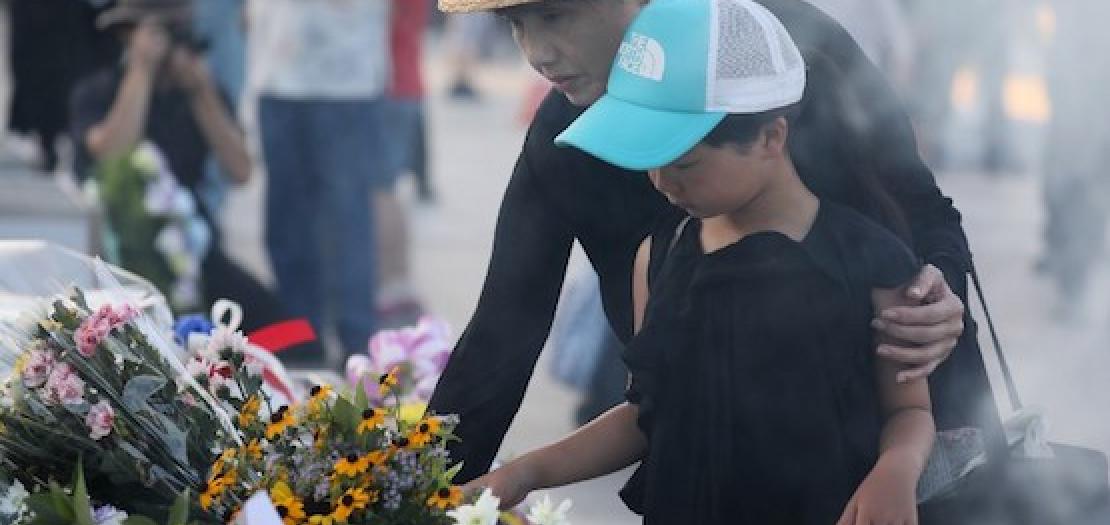Issued by the Catholic Center for Studies and Media - Jordan. Editor-in-chief Fr. Rif'at Bader - موقع أبونا abouna.org

Each year from August 6 to 15, the Catholic Church in Japan marks Ten Days for Peace. The period opens on the anniversary of the atomic bombing of Hiroshima and ends on the commemoration of the day Japan surrendered, ending the most destructive war in human history, World War II. During that time, there are prayers, gatherings, talks and such to reflect and recommit the church to peace.
This year's message from the president of the Catholic Bishops' Conference of Japan, Archbishop Mitsuaki Takami of Nagasaki, whose mother survived the atomic bombing of that city while carrying him in her womb, stressed the importance of a commitment to nonviolence.
However, this year the ten days were different from years past because of two major distractions. They were dominated by two men with funny hairdos — one black, the other orange.
To Japan's west, we face an erratic, unpredictable, immature nuclear-armed narcissist who talks facilely of using those weapons. To the east, we face another erratic, unpredictable, immature nuclear-armed narcissist who also seems willing to use those weapons.
The difference is that some people speculate (more in fearful hope than with conviction) that the Western actor's deeds and words may be at least to some degree intelligently calculated to achieve certain ends.
These two tonsorially tarted up tantrum throwers overshadowed Japan's Ten Days for Peace for the simple reason that if they get carried away by their own words or emotions, Japan will be in the path of the resulting chaos.
Ever since the end of the World War II, the United States has maintained a military presence in Japan, with bases throughout the country. Of course, those bases primarily serve American strategic interests, interests that include defense treaty obligations toward Japan.
However, a further major reason for the deployment of military resources in Japan is, in fact, to provide a base for operations on the Korean peninsula should the need arise.
Missiles flying to or from the Korean peninsula will likely fly over Japan. Several prefectural governments have already approached the national government in Tokyo for assurances that they will be protected in the event that North Korea fires missiles through Japanese airspace toward Guam. If missiles do start flying, Japan's anti-missile defenses, both Japanese and American, could become part of any altercation.
Though American bases in Japan are officially intended for the defense of Japan, their presence, in fact, makes the country a potential, or even likely, target in the event of a conflict involving the United States.
If nuclear weapons were to be used — and neither Kim Jong-un nor Donald Trump gives much cause for confidence that they would not be if hostilities broke out — Japan could be in the path of radioactive fallout even if it were not directly targeted.
In this matter, the future of Japan is out of Japanese hands. North Korea, South Korea, China and the United States will make the decisions or misjudgments that could mean destruction.
For the time being, Kim seems to be stepping back from his threat to fire missiles over Japan toward the U.S. territory of Guam. And the South Korean government has announced that it has received assurances from Washington that the U.S. will not take unilateral action without Seoul's agreement. However, can the mercurial leaders of North Korea and America be counted on to follow today's commitments tomorrow?
What is the world, and especially that part of the world called Japan, to do when it appears that we have no control over the situation?
Perhaps the answer is to be found in the Ten Days for Peace that Kim and Trump eclipsed.
I am not among those Christians who claim that it is enough to say a prayer and all will be well. We humans have probably been praying since we came out of the trees, and any evidence that it "works" is scant, to say the least.
One of the major events of the ten days is a torchlight procession marking the Aug. 9 atomic bombing of Nagasaki. That bomb exploded nearly directly over the city's cathedral as people inside were praying for peace.
The activities of the ten days are prayer, reflection, study, and action. They are, ultimately, weak in the face of the violence that Archbishop Takami urges us to renounce.
They may do one important thing in the face of the fact of powerlessness. They renew the conviction that St. Paul speaks of in Romans, that neither "peril or the sword" nor "rulers" "will be able to separate us from the love of God in Christ Jesus our Lord".
Our helplessness against the posturing of the powerful can remind us that ultimately, however, we may define victory or defeat, they will not drive God from us. From our perspective, that may not be much hope, but current events remind us that it may be the only realistic hope.







